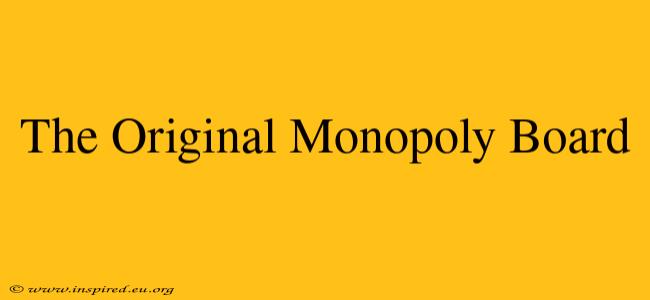Monopoly, the world-renowned board game of real estate and ruthless capitalism, boasts a history as captivating as the game itself. But what was the original Monopoly board really like? This article delves into the fascinating origins of this iconic game, exploring its evolution from a homemade creation to a global phenomenon.
From Homemade Game to Global Phenomenon: The Story of Monopoly
The game we know as Monopoly didn't spring fully formed from the mind of a game designer. Its roots lie in a homemade game created by Lizzie Magie in 1903. Magie's game, "The Landlord's Game," was designed to be a social commentary. It aimed to illustrate the economic inequalities inherent in land ownership. Unlike the cutthroat competition of modern Monopoly, Magie’s version had two sets of rules – one that rewarded competitive players and another that promoted cooperation. This shows a significant divergence from the aggressive gameplay of the version we are familiar with today.
Charles Darrow's Role in the Game's Evolution
While Magie's game laid the groundwork, Charles Darrow is often credited with bringing Monopoly to the masses. He refined and popularized the game in the 1930s during the Great Depression. Darrow's version simplified the gameplay, focusing on the competitive aspects that would make the game a sensation. This change reflects the societal shifts and anxieties during that period. He initially sold homemade versions before Parker Brothers purchased the rights and mass-produced the game.
Key Differences Between Magie's and Darrow's Versions
Several key distinctions exist between Lizzie Magie's original "The Landlord's Game" and the version popularized by Charles Darrow. These differences highlight the evolution of the game's focus and style.
- Gameplay Focus: Magie's game emphasized both competitive and cooperative play, acting as a social commentary. Darrow's version prioritized aggressive competition.
- Board Design: While both featured properties, the layouts and property names differed significantly. Darrow's board incorporated the streets of Atlantic City, New Jersey, giving it a stronger sense of place.
- Game Mechanics: Darrow streamlined the rules, creating a faster and more accessible game.
The Atlantic City Connection: Inspiration for the Board
The original Monopoly game board, as popularized by Darrow, featured the streets of Atlantic City. Darrow, inspired by his own experiences and observations of the city, meticulously recreated its layout on the game board. This geographic specificity adds a unique element to the game's appeal, connecting the abstract concept of real estate to a tangible location. It's interesting to note that the names and layout have remained largely unchanged in modern versions.
Iconic Properties and Their Atlantic City Counterparts
Many players are familiar with iconic Monopoly properties like Boardwalk and Park Place. These names directly correlate to actual streets in Atlantic City. Understanding this connection adds another layer of appreciation to the classic game.
- Boardwalk: The most expensive property on the board, reflecting its status in Atlantic City.
- Park Place: Another high-value property, further showcasing the game's inspiration.
- Mediterranean Avenue & Baltic Avenue: These properties, while less expensive, still reflect the real streets of Atlantic City.
The Legacy of Monopoly: A Timeless Classic
From its humble beginnings as a social commentary to its current status as a global phenomenon, the Monopoly board has had a profound impact on popular culture. Its simple yet engaging mechanics, combined with its tangible connection to a real-world location, have ensured its enduring popularity across generations. The original game, with its simpler rules and social commentary undertones, stands in fascinating contrast to the version played worldwide today. Understanding these origins allows for a deeper understanding and appreciation of one of the world's most beloved games.
Frequently Asked Questions
Q: Who invented Monopoly?
A: While Charles Darrow is often credited with its popularization, Lizzie Magie created the original game, "The Landlord's Game," in 1903.
Q: What city is the Monopoly board based on?
A: The board is based on the streets of Atlantic City, New Jersey.
Q: What is the significance of the original Monopoly board?
A: The original board, unlike the commercially successful versions, served as a social commentary on land ownership and economic inequalities. It reflects different design priorities, showing how the game evolved.
This article attempts to provide a comprehensive overview of the history and development of the original Monopoly board game, focusing on its origins, evolution, and lasting legacy. Further research into primary sources like historical game boards and documents pertaining to Magie and Darrow would provide even richer detail.
